CCTE-241: Colorado Rockies Alpine Backpacking & Rock Climbing
Course Code: CCTE-2441
Start Date: 6/7/24
End Date: 6/21/24
The Colorado Rockies are home to some of the most beautiful backpacking and rock climbing routes in the nation. On this course, you’ll experience the best of both worlds. Hike through alpine meadows and camp below gorgeous cirques of peaks. Work together with your crewmates to attempt to summit a high mountain peak. Then get a change of perspective and pace as you learn to climb rock walls. Instructors will teach you the fundamentals of climbing technique and safety. Experience the incredible feeling of accomplishing a route and pausing at the top to enjoy the views from above the trees. Previous experience is not necessary, and you do not need to be an all-star athlete to thrive on this course. Enthusiasm for taking on physical and mental challenges the most important thing to bring to course. Every day on this expedition will be an opportunity to expand your comfort zone, bond with your crew, and connect with the natural world. At the end of it all, emerge a confident and resilient leader with the tools to be your best self on the trails and at home.
Sawatch Range, Colorado
The Sawatch sub-range of the Colorado Rockies is home to Colorado’s two highest peaks: Mt Elbert (14,439’) and Mount Massive (14,429’). The range is known for expansive, rolling alpine terrain and multiple high peaks, and encompasses the headwaters of the Arkansas River. The source of the name is somewhat disputed but some source it to Ute words meaning “green place” or “blue water.” These regions are within the ancestral lands of the Núu-agha-tʉvʉ-pʉ̱ (Ute) nation.
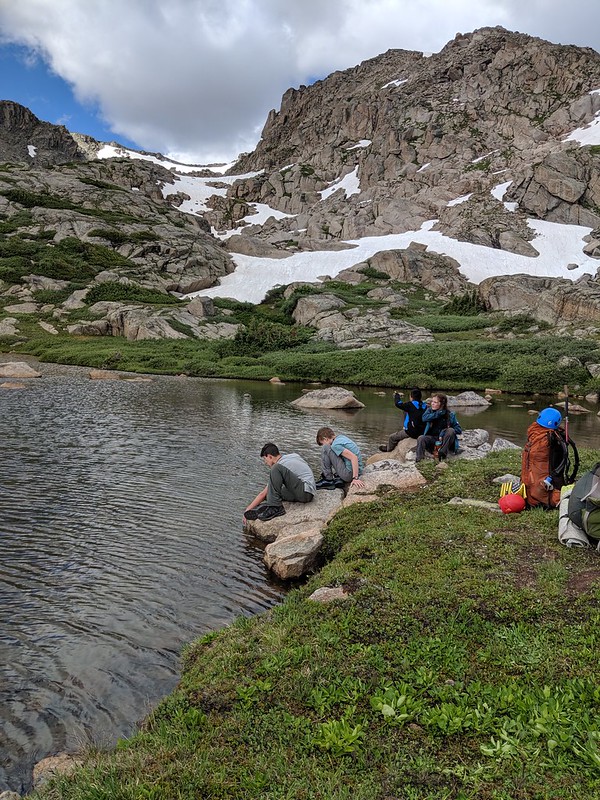
Photo: Terence Copeland |📍Núu-agha-tʉvʉ-pʉ̱ (Ute) lands
Leadville Mountain Center, Colorado
Colorado Outward Bound’s 600-acre property at the base of Mount Massive. Our base camp encompasses mountain streams, wild plants, fields and forests. Lake Fork Creek (that runs into the headwaters of the Arkansas River) runs near the east of our property and the Colorado Trail borders us to the west. If the timing is right, colorful wildflowers will brighten the trails through the LMC. You might share camp with elk, deer, chipmunks and myriad other wildlife. This region is within the ancestral lands of the Núu-agha-tʉvʉ-pʉ̱ (Ute) nation.
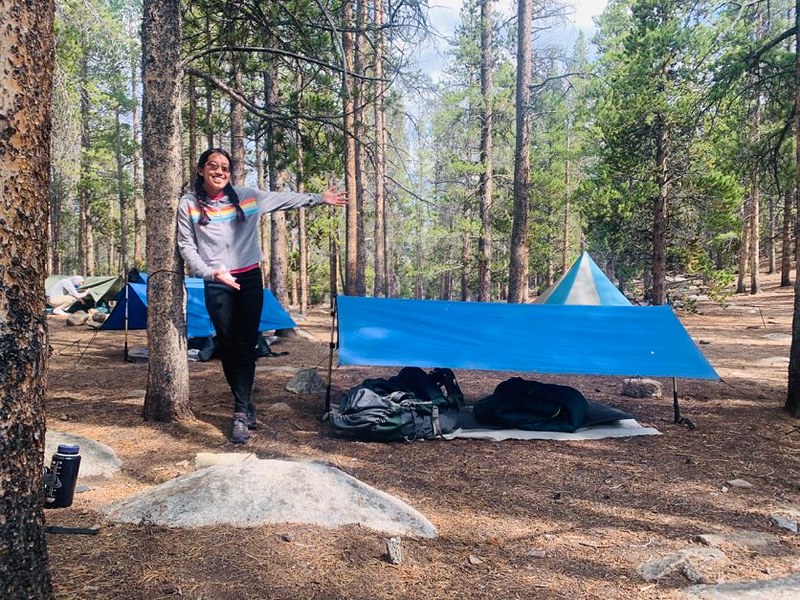
📍Núu-agha-tʉvʉ-pʉ̱ (Ute) lands
What is a land acknowledgment?
At the Colorado Outward Bound School, we include land acknowledgments in our work as a formal way to recognize and respect the traditional territories and Indigenous Peoples as stewards of the land. It is important to understand and acknowledge the comprehensive past, present, and future of the places we travel and to seek to understand our role therein. To recognize the land is an expression of gratitude and appreciation we give to the Indigenous Peoples who have been living and working on the land from time immemorial. Read more about land acknowledgments at Outward Bound here.
Turtle Rock
Nestled in the Arkansas Valley, Turtle Rock provides the perfect venue for learning the basics of rock climbing. With sweeping vistas of the Collegiate Range to the west, students will climb and rappel on weathered granite domes while camping among the pinon pines and sage brush, in this high alpine desert environment. The Turtle Rock Campground provides a great introduction to camping, while still allowing for some frontcountry amenities like pit toilets and potable water. These regions are within the ancestral lands of the Núu-agha-tʉvʉ-pʉ̱ (Ute) nation.
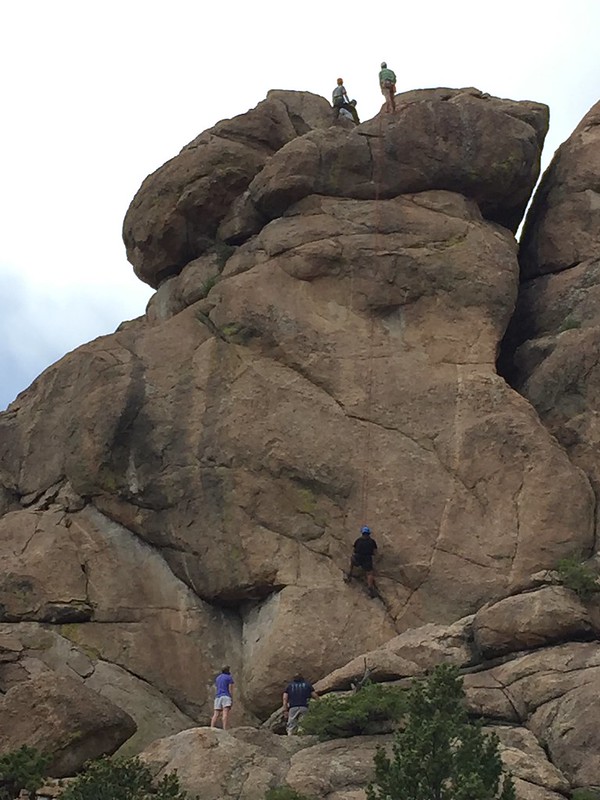
Photo: Bethany Frakes |📍Núu-agha-tʉvʉ-pʉ̱ (Ute) lands
Alpine Backpacking
Alpine Backpacking will develop a foundational outdoor skillset for students allowing comfortable living during course. Traveling mostly above treeline, students will carry everything they need - food, shelter, clothing and gear – allowing them to go deep into the mountains where few people can reach. Backpacking provides a sense of freedom, allowing students to eat when hungry, set up camp when tired, and exercise complete control over what is accomplished each day. The simplicity of backpacking gives students the opportunity to focus both internally on their own thoughts, as well as externally to connect deeply with others as they talk, sing, play games and spend time together without distraction. With the Rocky Mountains as a backdrop, students are introduced to backpacking with lessons in basic travel and camping techniques. As this section progresses, students learn Leave No Trace techniques, map and compass navigation, camp craft, and obtain an understanding of the area’s human and natural history.
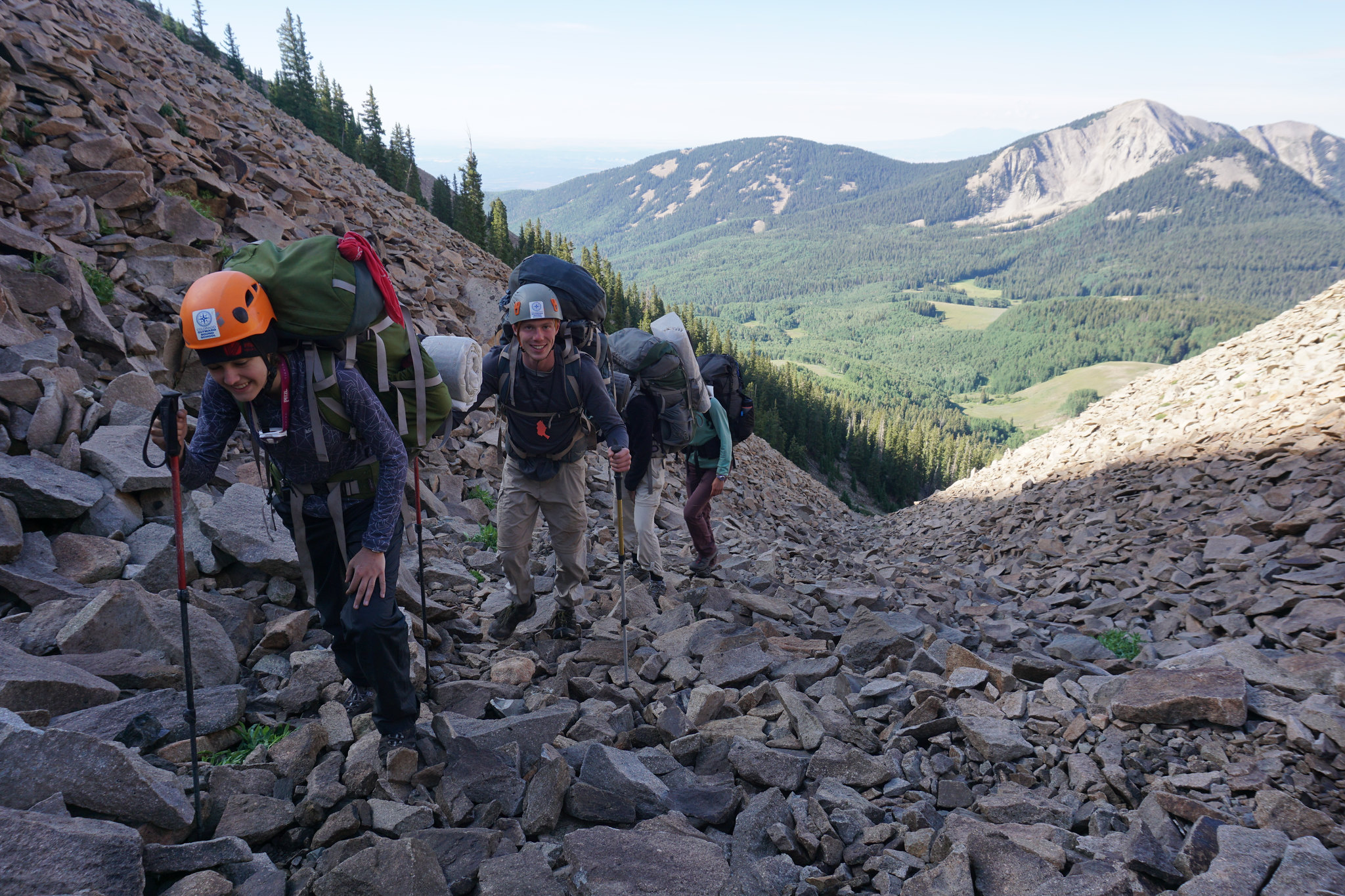
Photo: Dave Erbe |📍Núu-agha-tʉvʉ-pʉ̱ (Ute) lands
Rock Climbing
Outdoor rock climbing can be both mediative and thrilling, making it a highly rewarding sport mentally and physically. It’s a great opportunity to connect with others in the outdoors while also developing confidence in your body. Students will learn new body mechanics, balance, and climbing techniques. Instructors will help students set personal goals as they navigate the rock wall. They will get to experience the incredible feeling of accomplishing a route and pausing at the top to enjoy the views from above the trees. There are many ways to climb the same rock, allowing each climber to solve the puzzle in their own way.
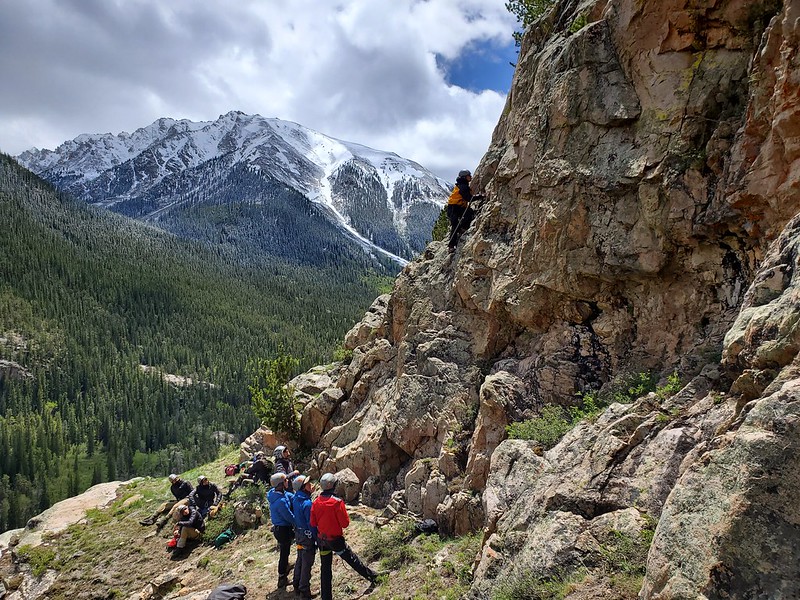
Photo: Joe Kubis |📍Núu-agha-tʉvʉ-pʉ̱ (Ute) lands
Guided Reflection and Transference
At Outward Bound we believe there is no learning without reflection. Throughout course, you will be prompted to reflect on what you’re experiencing on course, and what it means in the greater context of your life. Sometimes this is a journaling exercise, sometimes a group sharing experience, and sometimes a moment of solitude to sit and think. You spend focused time toward course progression end exploring how your new knowledge, skills and attributes can apply to your life after course.
Solo
Solo is a time when you’ll get the opportunity to spend time alone during course. With sufficient food and equipment, your Solo will be a chance to reflect on your course experience, journal, and connect with nature. Depending on your course length and environmental factors, Solo can range from 30 minutes to an overnight experience. You will not travel during this time and your Instructors may check on you occasionally. Your solo site will be close enough to your Instructors in case of emergency, but far enough removed to enjoy solitude. Many students are initially nervous about solo, but later recall it as one of the highlights of their course.
Service Project
Some projects focus on land restoration and are coordinated with partners and land managers like the US Forest Service, Bureau of Land Management and National Park Service. Other projects are grounded in social services, and may include visiting a nursing home or hospital. Past projects include working on a goat farm, building trails, cleaning trash and debris from natural spaces, working with a local community garden, and removing invasive species. Seeing the impact of their actions firsthand, students develop a value of service, and transfer this desire to serve their communities back home.
Peak Attempt
Peak Attempts present an opportunity for challenge, teamwork, and the need to pull together all of your learned skills for success. Your expedition will include at least one peak attempt. Peak attempts are major enterprises and typically require early morning starts and can take all day to complete. Weather, or other factors including group dynamics and physical readiness, may preclude even an attempt to ascend a peak.
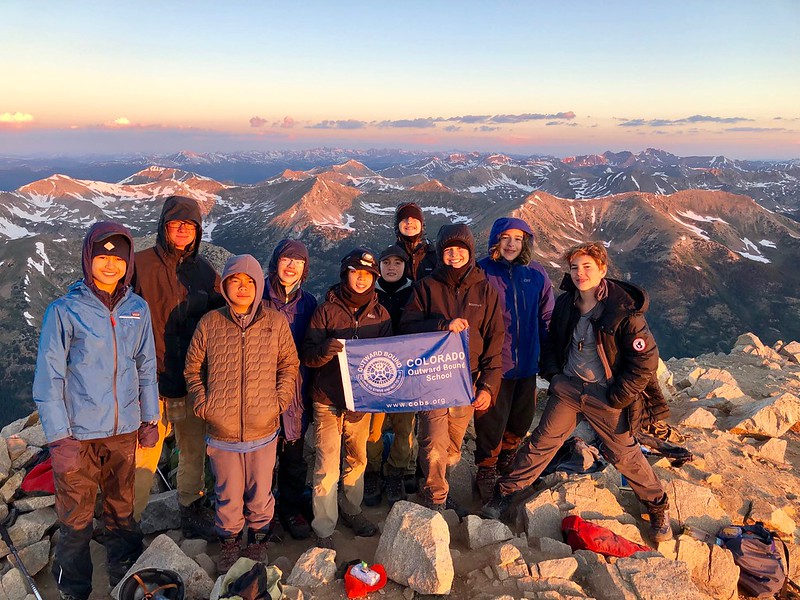
Photo: Naomi Winard |📍Núu-agha-tʉvʉ-pʉ̱ (Ute) lands
Challenge Event
A Challenge Event may occur at the end of a student's course experience. These are opportunities to test the perseverance, endurance, and grit that you've developed on course. A challenge event might be individual, like long run or peak attempt. Your event might be a group focused challenge, including long final travel days or group challenges that require all of the skills and teamwork your groups has learned. The purpose of a challenge event is to help students realize the extent of their growth, physically, mentally, and emotionally, and to take home these learnings in an unforgettable way.
Sample Itinerary
The following is an example of what your itinerary may look like. Your actual course plan will vary according to weather, your group’s skills and abilities, and Instructor preferences.
Curriculum includes:
Basic leadership
Basic team decision making
Basic camp craft and cooking
Outward Bound philosophy and history
Advanced top rope rock climbing skills
Belaying
Rappelling
Days 7-13: Backpacking and Peak Attempt
Curriculum includes:
Basic map and compass navigation
Basic first aid
Backcountry living
Group off-trail travel
Peer leadership
Time management
Self-Awareness
Conflict management
Reflection/Solo
Day 14: Challenge Event and Course End
Day 15: Transportation home
Our expeditions help students grow into the best version of themselves. We use adventure in the outdoors to help students discover their strengths and build authentic connections with their peers. Compassion for oneself and others is foundational to the Outward Bound experience. As students develop outdoor skills, they also gain confidence and leadership tools that will last a lifetime. Course outcomes include:
- Belonging – students form deep connections founded upon respect, inclusion, and compassion
- Reflection – students learn self-awareness and practice empathy towards others
- Physical Engagement – students develop awareness and confidence in their bodies
- Courage – students develop the confidence to speak up for themselves and persevere through challenges
Watch to Learn More
Tuition
You can pay your tuition online through your Applicant Portal or make the payment over the phone by calling 720-381-6589.
If your payment is not received by the due date listed in your Enrollment Email and on your Applicant Portal, you will risk losing your spot on course and your $500 deposit. Please review our Admissions and Cancellation Policies.
Travel Insurance
Airfare, travel costs, and non-refundable tuition payments are expensive. Insurance to protect your trip and course is strongly encouraged. We recommend insuring these costs from the third-party provider InsureMyTrip. This provider has coverage options that include travel costs and non-refundable tuition costs. For more information and to receive a free quote, click here.
Click here for COBS COVID-19 Program Practices